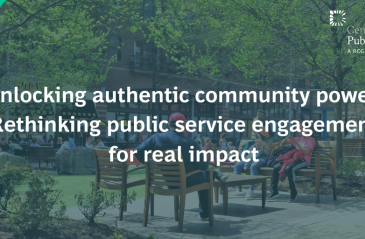
The power of storytelling in climate leadership

A passion for the ability of data and analytics to improve government performance
Share articleThe progress we were able to make stemmed in large part from having Governor O'Malley's support
Share articleStateStat meant we were analysing thousands of data points a week
Share articleWe put our vision for government into practice through learning partner projects that align with our values and help reimagine government so that it works for everyone.
I've had first-hand experience of the disconnect that can sometimes exist between policy and real-life impact. Although I am a lawyer by training, I started my government career in juvenile justice, serving as a probation officer in the state of Maryland.
It was an experience that continues to shape my thinking because there was no link between what I was doing and our sister agencies which we interacted with at an administrative level. We were all collecting data about the same families and providing services to the same people, but I had absolutely no access to their information, even though it would have made my life a lot easier as a probation officer, helped me make better decisions, and ultimately provided better outcomes for children in our state. This sparked a passion for the ability of data and analytics to improve government performance that continues to this day.
I became a big advocate of intra-agency data sharing as a means for us to make better decisions in the lives of the people we were trying to impact, but also in order to reform government. Martin O'Malley, then incoming governor of Maryland, agreed. During his terms as mayor of the city of Baltimore he had prioritised data and delivery and it was an approach that continued when he moved into the governor's office in Annapolis.
I became his director of StateStat - the state's performance management programme - and also headed up his Delivery Unit. These twin roles meant I oversaw about 85% of the state's budget and a comparable amount of its workforce. StateStat was very much about using data to achieve operational efficiencies - it wasn't about 'delivery' in the traditional sense. Instead, we aimed to make more efficient decisions in order to achieve better services to the public and save money at the same time.
The progress we were able to make stemmed in large part from having Governor O'Malley's personal backing. It wouldn't have worked without a leader who was willing to stand up and say that this was how we were going to run government. He was very clear that everything we would do and say would be positioned around resident outcomes. Cabinet secretaries and chiefs of police and housing authorities knew that - with our help - they would have to change the way they did their jobs. Without that level of backing I would have been totally ineffective.
During his time as governor, O'Malley met Sir Michael Barber, the former head of the Number 10 Delivery Unit in the UK. They had an instant connection because O'Malley really wanted to laser in on specific outcomes. StateStat meant we were already analysing thousands of data points a week, but we were now using it to also make cross-cutting policy decisions, make our agencies work together and to frame our efforts around outcomes.
Today, I continue to use data and metrics to fuel my work at the helm of the Center for Government Excellence at John Hopkins University, where we are spearheading Bloomberg Philanthropies' What Works Cities initiative. Over the next couple of years we will work with 100 midsize cities across the US. We will create a national baseline for cities' and mayors' ability to use data and evidence and lend our efforts to advancing and elevating these practices, which for us are the use of data and performance analytics.
In particular, we are looking at how data can be connected to outcomes - not only to improve people's lives but also to reform government for the better. Now there's a couple of actions anyone can get behind.











